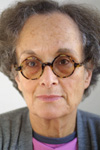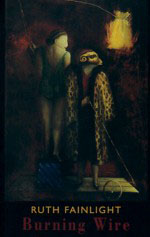
Ruth Fainlight was born in New York
City, but has lived in England since the age of fifteen. After
adjusting to the English educational system, she went to art college,
lived for some years in France and Spain, and later married the writer
Alan Sillitoe. They now divide their time between a flat in London
and a cottage in a Somerset village.
Ruth Fainlight has published
thirteen collections of poems in England and the USA, as well as two volumes of
short stories, and translations from French, Portuguese and Spanish.
Selections of her own poems have been published in book form in
Portuguese, French and Spanish translation.
She received the
Cholmondeley Award in 1994, and her 1997 collection, Sugar-Paper
Blue, Bloodaxe Books 1997 & Dufour Editions USA 1998, was
shortlisted for the 1998 Whitbread Award.
Her latest collection is Burning
Wire, Bloodaxe & Dufour 2002.
In 1985 and 1990 she was
Poet in Residence at Vanderbilt University, Nashville, Tennessee,
USA.
Her operatic work includes
libretti commissioned for the Royal Opera's Garden Venture in 1991 and
1993. The Dancer Hotoke, composer Erika Fox, was
nominated for the 1992 Laurence Olivier Awards. Her TV opera, Bedlam
Britannica, was transmitted on Channel 4 in September 1995.
She was Writing Tutor at the
Contemporary Opera and Music Theatre Lab for the Performing Arts Lab (PAL)
for its last three seasons in 1997, 1998 and 1999.
Ruth Fainlight has served on the
Council of The Poetry Society, and is a member of the Society of Authors
and the Writers in Prison Committee of English P.E.N.
She has read her work at
festivals and conferences, universities, schools and libraries in
Argentina, Canada, England, France, Greece, India, Israel, Italy, Japan,
Macedonia, Peru, Portugal, Scotland, Spain, Sweden, Uruguay, USA and Wales.

Poetry
Cages 1966
To See the Matter
Clearly 1968
from Macmillan UK; Dufour Editions, USA
- The Region's Violence 1973
Another Full Moon 1976
Sibyls and Others 1980
Fifteen to Infinity
1983
Selected Poems 1987
The Knot 1990
from Hutchinson or CenturyHutchinson, UK
-
- Fifteen to Infinity
also published 1987, Carnegie-Mellon University Press USA
-
- Climates 1983
from Bloodaxe Books UK
-
- This Time of Year 1994
Selected Poems
1995 (updated new edition)~
from Sinclair-Stevenson UK
-
- Sugar-Paper Blue
1997
* * * Shortlisted for 1998 Whitbread Poetry Prize *
* *
from Bloodaxe Books UK, Dufour
Editions USA
-
Artist's
books
(text: poems by Ruth
Fainlight)
Sibyls, 1991, with woodcuts by Leonard
Baskin
from Gehenna Press USA
Pomegranate, 1997, mezzotints by Judith
Rothchild
from Editions de l`Eau, Ceret, France
Leaves/Feuilles, 1998, (bi-lingual,
French/English, tr. M.Duclos), mezzotints by Judith Rothchild
from Editions Verdigris, Octon, France
Feathers, 2002, mezzotints by
Judith Rothchild
from Editions Verdigris, France
Sheba and Solomon,
2004, drypoints by Ana Maria
Pacheco from Pratt Contemporary Art, UK
Short
Stories
Daylife and Nightlife
1971
from Andre Deutsch
UK
Dr. Clock`s Last Case
1994
from Virago Books
UK
Translations
All Citizens Are Soldiers (with Alan
Sillitoe) 1966
from Macmillan UK; play, from Spanish of Lope de Vega (original title: Fuenteovejuna)
Navigations 1983, Casa da
Moeda, Portugal and Marine Rose 1987, Black Swan USA, poems, from Portuguese
of Sophia de Mello Breyner Andresen
Selection of poems by Jean Joubert, from French, included in
Selected Poems 1995
Poetry
Collections by Ruth
Fainlight
in translation
(Italian)
La Verità sulla Sibilla 2003, tr. Alessandra Schiavinato and
Paolo Ruffilli, published by Edizioni del Leone, Venice, Italy
(Portuguese)
Visitação 1995, edited by Ana Hatherly, Quetzal Editores,
Lisbon, Portugal
(French)
Encore la Pleine Lune 1997, tr.M.Duclos & J.Joubert,
Editions Federop, Eglise-Neuve d'Issac, France
Leaves/Feuilles 1998,
tr. M.Duclos, Editions Verdigris, Octon, France
Bleu Papier-Sucre 2000,
tr. M.Duclos, Les Amis de la Poésie, Bergerac, France
(Spanish)
Poemas 2000, tr. B.Varela, L.Graves, M.Negroni, J.Capriata,
M.Lauer Editorial Pequeña Venecia, Caracas, Venezuela
Poems by Ruth
Fainlight
in translation
(Russian)
The poem "Sugar-Paper Blue" was translated into
Russian by Marina Boroditskaya and is published in the April 2003 issue of the
Moscow monthly Inostrannaya Literatura (Foreign Literature).
The poem sequence "Sheba
and Solomon" has been translated into Russian by Marina Boroditskaya
and published in Moscow in the literary magazine Novaya Younost in
2003.
Criticism:
Radio
BBC World Service,
Kaleidescope & other
BBC Radio Three and BBC Radio Four programs
Criticism:
Press
Book reviews for Times Literary
Supplement, The Guardian, The Independent, Poetry Review, Jewish
Quarterly, Jewish Chronicle, European Judaism, Financial Times, London
Magazine, PN Review

Excerpts from reviews
of poetry collections by Ruth Fainlight
"Her new book has the
steadiness and clarity of the moon itself".
Peter Porter, The Observer
"A formidable
collection ... If there is a suggestion of feminist defiance here, so much
the better; at least Fainlight isn't strident. With so much talent and
confidence, she doesn't need to be".
Derek Mahon, London Review of Books
"In a tradition various
enough to include Emily Dickinson, Mary Coleridge, Christina Rossetti and
Charlotte Mew, her poetry gets on with itself, not self-absorbed but quite
independent".
John Bayley, London Review of Books
"... in Fainlight, we
are in the presence of someone engaged in understanding herself as an
artist more than anything else .... the lyric poet at her most mature ....
and American poets might do well to read (her). Straightforwardness is a
trait I have always valued in our poetry and missed in poetry from across
the Atlantic. Lately, I miss it in ours, but find it in the work of
this expatriate".
Mark Jarman, The Hudson Review, USA
"It may seem strange to
place William Empson, that masterful wizard of ingenious and knotty
structures, at the mouth of Ruth Fainlight's quiet, paradoxically discreet yet
sibylline cave of making, but as I became absorbed by these 'Selected
Poems' I found that it was a remark of his which helped me to define their
quality: "The first or only certain reason for writing verse is to
clear your own mind and fix your own feelings". .... Ruth Fainlight's
poetry is
... increasingly generous with its rewards".
John Mole, Poetry Review
"... her poems combine
Alice Munro's virtues with something more archaic and also, in exact clear
words, give us truly new visions of usual and mysterious
events".
A. S. Byatt, The Independent
"To my mind, the
virtues of Ruth Fainlight's voice have never been more needed. At a time when
there are so many ready to urge poets to take their place in the media
market-place, Fainlight's poetry is a reminder that poems are not merely
products for display and sale, but arise out of privacy and
dedication".
Elaine Feinstein, The Jewish Quarterly
"Her voice can be
cutting as well as lyrical. Fainlight is terrific on the subject of
ageing".
Helen Dunmore, Poetry Review
"Ruth Fainlight has always been a
painterly poet, sensuous and observant, who has paid particular attention
to myth as it shapes destiny or gives meaning. 'Sugar-Paper Blue' is one
of her finest books to date .... the reader is aware of images being
thought and felt through, the mind winding itself into narratives,
prompted now by pain, now loss, now keen pleasure".
George Szirtes, Times Literary Supplement
"When Ruth Fainlight visited
Leningrad in 1965, her guide's parents showed her the books, pamphlets and
poetry they had "guarded through the terrible years". The
title poem of her new collection opens in a blue-walled room with the
sound of footsteps overhead. The footsteps are those of Anna
Akhmatova, old, ill, yet "a good neighbor". Akhmatova was
already an iconic figure to Fainlight. Her clumsy attempts to catch
a glimpse of the Russian poet lead to a beautifully placed collision
between the Leningraders and the young Westerner who has not yet learned
"That what/ I wanted could not happen". And the older
Fainlight is observed with equal candour, in an unusual poem called 'Young
Men', about sexual desire which will never demand fulfilment".
Helen Dunmore, The Observer
From The Oxford Companion
to English Literature, (2000)
"In her first collection, her distinctively cool, ironic, yet not
dispassionate voice spoke clearly: it shows some affinity with the tone of
Robert Graves .... Her topics are both domestic and global: she combines,
often in one poem, the personal and the austerely detached, and excels at
the uncanny casual note of recognition".
|



